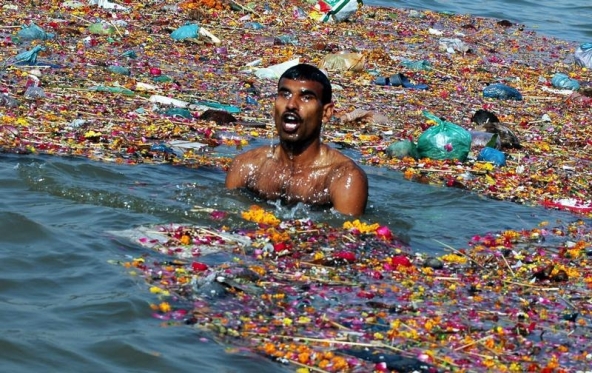
Narendra Modi government's proposal to rejuvenate river Ganga as a water corridor is a threat to aquatic life and will boost pollution level, according to environmentalists, who proposed to install sewage treatment plants instead.
Environmental scientists, working for the Ganga Rejuvenation Programme team, claims the proposal to construct dams and barrages at every 100 km, and facilitate navigation of small ships between Varanasi and Hooghly will affect the lives of water animals and plants.
"If these barrages will be constructed on the river Ganga at every 100 KM then the divided part of this holy river would become like 10-15 separate large ponds, where the river's continuous flow of water will be obstructed, raising serious threat and rise in water pollution levels," NDTV quoted Banaras Hindu University (BHU) IIT Professor Vishwambhar Nath Mishra.
Union Minister for Road Transport, Highways and Shipping Nitin Gadkari had earlier made proposals to the World Bank for the construction of barrages and water corridors between Varanasi-Hooghly and also Allahabad-Haldia.
Environmentalists and subject experts are pressing on the need to rejuvenate the river, in terms of cleanliness, which they claim has been ignored by the government.
"Ganga Manthan lacked the discussions on how to ensure continuous and uninterrupted flow of river from Gangotri to Ganga Sagar to be maintained. It is sad that no one discussed how the flow should be maintained," said BD Tripathi, National Ganga River Basin Authority member and Environmentalist at BHU.
They instead stressed on the need to install Sewage Treatment Plants (STP), which they consider a major step towards making Ganga pollution free.
The pollution level of Ganga
Ganga reportedly falls among the top 10 most polluted rivers in the world. Uttarakhand Environment Protection and Pollution Control Board (UEPPCB) study in 2011 revealed that the level of coliform bacteria in Ganga is 5,500 mpn/100 ml which is a threat to human lives, according to reports.
Coliform, generated from feces, is considered good for agriculture if present in limited level i.e. 5,000 mpn/100 ml but its excess level is highly dangerous for human beings. The present level is higher than the required, i.e. 50 mpn/100 ml for drinking and 500 mpn/100 ml for bathing.
The direct disposal of sewage in the river is the primary cause for extremely high level of coliform in the Ganga water, according to UEPPCB research. Approximately 89 million litres of sewage is released into the river per day from 12 municipal towns falling in its route.
The Allahabad state pollution control board and the Central Pollution Control Board in 2013 revealed that the pollution level in the river exceeded alarmingly during the Kumbh Mela Festival, when devotees from across the nation came in lakhs to bathe in the river.
Additionally, river water turns toxic down the stream due to the industrial waste mixed with sewage in Kanpur, where the sewage treatment plant holds the capacity of treating only 117 ml/day against 280 ml sewage released per day.
Varanasi, with just three sewage treatment plants, is capable of treating just 122 ml waste per day against 350 ml generated a day. However, the two dysfunctional units are incapable of performing the task while power cuts interrupt the third one, leading to discharge of 225ml/day, according to reports.
Hence, environmentalists believe that the investment of around ₹80,000 crore for the rejuvenation of the river will be useless if the government spends it on infrastructural projects only. What Ganga needs now is cleaning programmes to revive the deteriorating condition of the river.
Terming Rajiv Gandhi's project Ganga Action Plan a failure, Mishra said that the NDA government need to figure out a solution apart from just spending money.
"Then why was GAP a failure where huge sums of money were pumped in for cleaning the river? Constructing dams, or barrages will affect the health of the Ganga, so why is the NDA government doing the same thing? Why are they repeating the same mistakes that have been committed by the successive previous regimes?" Mishra said.






!['He is done with the team now' : Angry Virat Kohli slams the bat, kicks the ground, yells at RCB team as SRH smashes runs [reactions]](https://data1.ibtimes.co.in/en/full/796956/he-done-team-now-angry-virat-kohli-slams-bat-kicks-ground-yells-rcb-team-srh-smashes.jpg?w=220&h=138)






